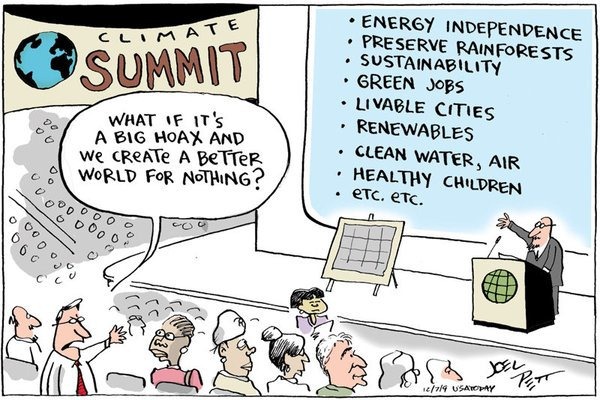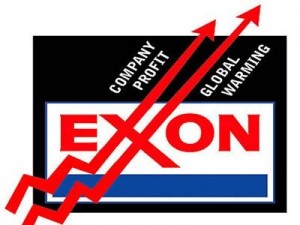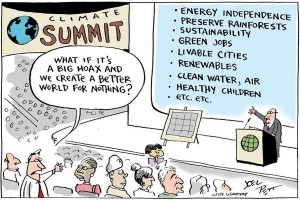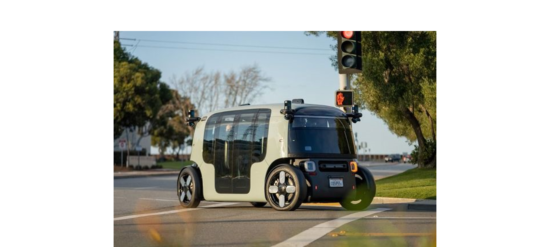April 13, 2014 – Last week the IPCC gave us its weather forecast for climate change through the rest of the century. This weekend the contributing scientists told us what should be our marching orders.
In the report it states, “Climate change has the characteristics of a collective action problem at the global scale, because most greenhouse gases (GHGs) accumulate over time and mix globally, and emissions by any agent (e.g., individual, community, company, country) affect other agents. International cooperation is therefore required to effectively mitigate GHG emission and address other climate change issues.”
You might have thought that statement to be obvious but in our human world self-interest tends to be short-sighted. Hence you get statements like the one ExxonMobil recently made to its shareholders in assessing carbon risk. According to Exxon cutting GHGs to the extent required to meet the IPCC’s objective of limiting warming to no more than 2 degrees Celsius (3.6 Fahrenheit) would mean an 80% reduction. That doesn’t sit well with a company sitting on vast reserves of oil and gas. After all these would become stranded assets. In other words, liabilities sitting on the company’s balance sheet. So in the interest of self-interest Exxon states, “the scenario where governments restrict hydrocarbon production in a way to reduce GHG emissions 80 per cent during the outlook period to 2040 is highly unlikely.” And better yet “based on this analysis, we are confident that none of our hydrocarbon reserves are now or will become stranded.” In fairness to Exxon they do have a plan to mitigate carbon. Use their oil and gas to replace all those dirty coal-fired power plants and they will have done their bit in cooperating to mitigate GHGs.
Exxon isn’t alone. Chevron and BP have made similar statements. We expect to hear from Shell and Total in the near future. I suspect they will tell the same story.
So what do ordinary folk do when government seems incapable of acting on the climate file, while big oil companies blatantly go on doing what they have always done? Is our human will to address climate change moribund? Are we to let “business as usual” both in government and industry impact the lives of our children and their children?
The IPCC in its latest report incorporating mitigation strategies provides us with 900 behavioral and technological options for dealing with climate change. The goal is to keep the mean temperature of the planet from rising no more than 2 degrees Celsius in this century. To do that we need to not let CO2 levels exceed 500 parts per million (ppm) in the atmosphere. Presently we are 80% there. If we can keep CO2 number below 430 ppm we can limit the rise in temperature to 1.5 degrees Celsius (2.7 Fahrenheit). If we can do the latter we could actually begin to see a decline in atmospheric temperatures sometime in the 22nd century. But to act as a society to solve a problem outcome a century away takes conviction on the part of all of humanity, even the Exxon’s of the world.
Another thing that the IPCC is telling us is that delaying mitigation efforts by even a decade changes long-term outcomes in terms of global temperature rise. And every decade of delay has associated long-term climatic, political, security, financial and survival consequences.
There is no doubt that global action requires a global carbon tax.
There is no doubt that global action requires that fossil fuel assets in the ground remain there until we at least begin to see a decrease in global average temperatures possibly centuries from now.
Today we are locked in to fossil fuels. Every year we remain this way we compound the problem of addressing climate change with mitigation strategies that can work.
Decarbonizing our society means decarbonizing the way we generate the electricity that runs our planet. That means taking all those other ways we generate electricity, wind, solar, geothermal, tidal, wave, nuclear, hydro and flipping the pie chart from their current contribution of less than 30% to as much as 80% by 2050. And by 2100 eliminating carbon-generated electrical power completely.
Decarbonizing our society means decarbonizing transportation. That means a rapid phase in of alternatives to the internal combustion engine and diesel. It means immediate improvements to the efficiency and emission reductions of these vehicles while electric vehicle technology, hydrogen and fuel cell technology initiatives move us away completely from carbon-based means of transportation. It means developing mass transit in urban settings where almost 80% of us will live by the mid-21st century. It means changing how we build and energize homes and offices, and the retrofitting of existing structures to decarbonize them.
For industry it means new processes and innovation shifting away from carbon-based energy. And of course it means that all industries that produce GHG emissions implement carbon recovery technologies.
It means developing a decarbonizing strategy associated with waste management. We talk today about reduce, re-use and recycle. But worldwide our efforts here are barely registering with only 20% of global municipal waste reprocessed through recycling programs. In decarbonizing waste through re-use and recycling we can recover more of the energy from it and further reduce the use of fossil fuels responsible for much of our waste content.
In decarbonizing our planet we need to end deforestation and begin afforestation, planting lots more trees. In agriculture decarbonization will mean better cropland and grazing land management. What we create from agriculture production will require us to develop better ways to handle the full cycle of production in a far more sustainable way.
For the policymakers of our planet, those we elect and those who govern, action plans should no longer be talking points but rather concrete, budgeted, regulated and enforced. The time for talk is over. And if national governments cannot lead the way then let the governments that will impact more of us in the coming decades, our municipal leaders, drive the agenda. Today thousands of cities have already started down the path of enacting climate action plans. Today cities lead the way in reducing and managing waste. Today cities are seeking mass transit alternatives to the internal combustion engine to move people around. And today cities are looking at green roofs, green energy, urban farms and other strategies to mitigate climate change.
In the IPCC report it states, “to reduce net GHG emissions and/or to enhance resilience to climate change” we will collectively have to spend between $343 and 385 billion U.S. annually. Every decade we delay the dollar cost will rise.
To those of you who read this blog and are of a political stripe, I encourage you to read the final draft of the IPCC Summary for Policymakers. Commit to act on climate change. Commit to decarbonizing. Your descendants will thank you.






















The IPCC is such a flawed, corrupt organization I don’t see how anyone could take them for face value:
http://stevengoddard.wordpress.com/2013/09/27/no-warming-for-70-of-the-ipccs-history/
Sep 27, 2013
Time for some realism – but IPCC takes baby steps and in the end fails
IPCC Fails to Acknowledge It’s Failings
This complete lack of warming through most of the IPCC’s history has led them to 95% certainty that humans are heating the world out of control. That level of certainty “has increased with every report,” notes Dr. Hayhoe, an expert reviewer for the IPCC. “Because we have more data, we have more science, we have more observations.”
The general theme of obscurantism runs across the document. Whereas in previous years the temperature records have been shown unadulterated, now we have presentation of a single figure for each decade; surely an attempt to mislead rather than inform. And the pause is only addressed with handwaving arguments and vague allusions to ocean heat.
The only facts we have are the evidence of measurements: first that average temperatures have trended upwards since the end of the Little Ice Age (but not smoothly) and second that the levels of carbon dioxide in the atmosphere have risen significantly and are continuing to rise as more coal, gas and oil is burnt. The third fact is that the infra-red absorption properties of CO2 mean that increasing levels will lead to modest temperature rises. That much is clear, but the IPCC reasoning is that this warming is reinforced by positive feedbacks, so raising temperatures considerably more. There is currently no evidence of this so we all, citizens and governments alike, are effectively being asked to trust the IPCC and push ahead with radical and expensive changes to our energy generation and use. Any critical comments which weaken the argument for action are being slapped down.
Yes, read through the AR5 completely and you will find only the summary alludes to human caused climate change
As much as I think that the IPCC process of serving information to the public is flawed, the science from all the source documents and research that I have been studying is in total agreement with the conclusions. We are observing overall atmospheric warming at an unprecedented rate since the 1950s. This correlates with the increased use of fossil fuels as an energy source. To describe, therefore, the conclusions of the IPCC reports as a reflection of a corrupt and purposeful organization aimed at wasting human resources and money on solutions we don’t need, is being purposefully blind to reality.
[…] IPCC Lays Out its Climate Change Mitigation Strategy […]